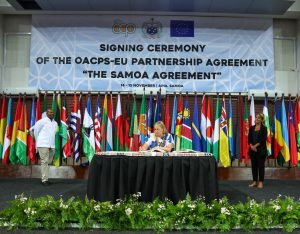SAMOA AGREEMENT SIGNATORIES

Signatories to the Samoa Agreement are 48 African countries, 16 countries from the Caribbean and 15 Pacific countries — accounting for about two billion people.
Africa
1. South Africa
2. Angola
3. Cape Verde
4. Benin
5. Botswana
6. Burkina Faso
7. Burundi
8. Cameroon
9. Central African Republic
10. Comoros
11. Congo (Brazzaville)
12. Congo (Kinshasa)
13. Côte d’Ivoire
14. Djibouti
15. Eritrea
16. Ethiopia
17. Gabon
18. Gambia
19. Ghana
20. Guinea
21. Guinea-Bissau
22. Equatorial Guinea
23. Kenya
24. Lesotho
25. Madagascar
26. Liberia
27. Malawi
28. Mali
29. Mauritius
30. Islamic Republic of Mauritania
31. Mozambique
32. Namibia
33. Niger
34. Nigeria
35. Uganda
36. Rwanda
37. Sao Tome and Principe
38. Senegal
39. Seychelles
40. Sierra Leone
41. Somalia
42. Sudan
43. Eswatini
44. Tanzania
45. Chad
46. Togo
47. Zambia
48. Zimbabwe.
The Caribbean
49. Antigua and Barbuda
50. Bahamas
51. Barbados
52. Belize
53. Cuba
54. Grenada
55. Guyana
56. Haiti
57. Jamaica
58. Dominican Republic
59. Saint Christophe and Nevis
60. Saint Vincent and Grenadines
61. Saint Lucia
62. Suriname
63. Trinidad and Tobago
The Pacific
64. Cook Islands
65. Marshall Islands
66. Solomon Islands
67. Fiji
68. Kiribati
69. Micronesia
70. Nauru
71. Niue
72. Palau
73. Papua New Guinea
74. Samoa
75. Timor Leste
76. Tonga
77. Tuvalu
78. Vanuatu.
============
Samoa Agreement: EU and its Member States sign new Partnership Agreement with the Members of the Organisation of the African, Caribbean and Pacific States

The denomination of the Agreement was agreed at the 46th session of the ACP-EU Council of Ministers, which took place right before the signature ceremony, also in Samoa.
The new Partnership Agreement lays down common principles and covers the following priority areas:
- human rights, democracy and governance
- peace and security
- human and social development
- inclusive, sustainable economic growth and development
- environmental sustainability and climate change
- migration and mobility
The agreement includes a common foundation, which applies to all Parties, combined with three regional protocols for Africa, the Caribbean and the Pacific with a focus on the specific needs of each region.
The 27 EU member states and the 79 African, Caribbean and Pacific countries together represent around 2 billion people and more than half of the seats at the United Nations. With this new Agreement, the Parties will be better equipped to address emerging needs and global challenges, such as climate change, ocean governance, migration, health, peace and security.
Next steps
The provisional application of the Agreement will start on 1 January 2024.
The Agreement will enter into force upon consent by the European Parliament and ratification by the Parties, i.e. all EU Member States and at least two thirds of the OACPS Members.
Background
The ACP-EU partnership is one of the oldest and most comprehensive frameworks for cooperation between the EU and third countries.
The previous legal framework for the partnership, the Cotonou Agreement, was signed in 2000.
The post-Cotonou negotiations started in September 2018, under the leadership of Commissioner Neven Mimica, in the margins of the United Nations General Assembly in New York. The chief negotiators initialled the new Agreement in April 2021.
The Council adopted a decision on the signature and provisional application of the Agreement on 20 July 2023.
============